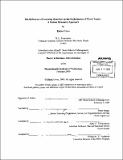The influences of learning behavior on the performance of work teams : a system dynamics approach
Author(s)
Lizeo, Elaine, 1968-
DownloadFull printable version (4.868Mb)
Other Contributors
Sloan School of Management.
Advisor
Peter Senge.
Terms of use
Metadata
Show full item recordAbstract
This thesis seeks to apply the tools of system dynamics to the study of the influences of learning-oriented behaviors on team performance and to investigate what factors foster team learning in the organizational environment and what factors hinder it. To address this issue, I examine existing works in the organizational learning field, including a thoughtful, descriptive model of team learning developed by Amy Edmondson of the Harvard Business School. Her model focuses on psychological safety -- a shared belief held by team members that the team is safe for interpersonal risk-taking -- as a construct that facilitates learning behavior, which in tum influences team performance. Drawing on Edmondson's team learning model and on textual analysis, I develop causal loop diagrams to capture endogenous processes which, theorists argue, influence team learning and promote performance. Using Edmondson's descriptive model as a starting point, I develop a formal simulation model to understand the dynamics created by learning initiatives. I describe the formulation in detail, relating the simulation model to Edmondson's model and to supporting theories on organizational learning, mainly to those developed by Chris Argyris, Edgar Schein and Peter Senge. Simulation tests are carried out to address the question: What are the factors that promote a team's engagement in learning behavior? The simulation results show three factors that play a critical role in fostering team learning and promoting performance: ( 1) less aggressive performance goals; (2) a minimum level of psychological safety; and (3) a high level of team self-confidence. Understanding such factors and their effects is of use to academics developing theories of organizational learning and to managers trying to implement or review learning initiatives.
Description
Thesis (M.B.A.)--Massachusetts Institute of Technology, Sloan School of Management, 2000. Also available online on DSpace at MIT. Includes bibliographical references (leaves 83-86).
Date issued
2000Department
Sloan School of ManagementPublisher
Massachusetts Institute of Technology
Keywords
Sloan School of Management.